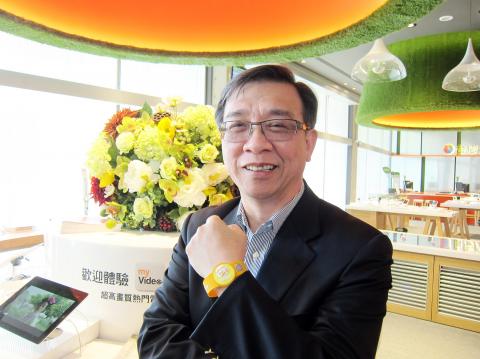Taiwan Mobile Co (台灣大) has considered the nation’s graying population with a near-field communication (NFC)-capable smart bracelet that could help senior citizens find their way home.
When lost, wearers can swipe the bracelets over any NFC-enabled smartphone to alert authorities to their location, pinpointed by GPS, the nation’s second-largest mobile carrier said yesterday.
“This marks the first NFC-based electronic tagging feature in a smart bracelet in Taiwan, and it could raise people’s willingness to help find senior citizens who get lost,” Taiwan Mobile president James Cheng (鄭光遠) told a press conference.

Photo: Wang Yi-hung, Taipei Times
The company plans to distribute 4,000 bracelets for free in Taipei and New Taipei City in partnership with the Foundation for the Welfare of the Elderly, and in Pingtung County with the Bjorgaas Social Welfare Foundation.
The bracelets could help the 200,000 Taiwanese seniors who have Alzheimer’s disease, Cheng said.
The Foundation for the Welfare of the Elderly has said that about 58 percent of people with Alzheimer’s who become lost are found within a short period of time, but the technology in the bracelet could increase that number to 100 percent, Cheng said.
Cheng also mentioned Taiwan Mobile’s plans to sell fourth-generation (4G) smartphones that support the nation’s unique 700 MHz frequency, saying the company would launch 10 smartphone models capable of using the frequency in the third quarter of this year, when its 4G network is due to be inaugurated.
The phones include a Taiwan Mobile-branded 4G phone made by Hon Hai Precision Industry Co (鴻海), the main manufacturer of Apple Inc’s iPhones and iPads.
Taiwan Mobile will increase its 700 MHz 4G phone selections to as many as 40 models by the end of the year, thanks to 4G LTE chips launched by suppliers such as Qualcomm Inc, Cheng said.

TARIFFS: The global ‘panic atmosphere remains strong,’ and foreign investors have continued to sell their holdings since the start of the year, the Ministry of Finance said The government yesterday authorized the activation of its NT$500 billion (US$15.15 billion) National Stabilization Fund (NSF) to prop up the local stock market after two days of sharp falls in reaction to US President Donald Trump’s new import tariffs. The Ministry of Finance said in a statement after the market close that the steering committee of the fund had been given the go-ahead to intervene in the market to bolster Taiwanese shares in a time of crisis. The fund has been authorized to use its assets “to carry out market stabilization tasks as appropriate to maintain the stability of Taiwan’s

STEEP DECLINE: Yesterday’s drop was the third-steepest in its history, the steepest being Monday’s drop in the wake of the tariff announcement on Wednesday last week Taiwanese stocks continued their heavy sell-off yesterday, as concerns over US tariffs and unwinding of leveraged bets weighed on the market. The benchmark TAIEX plunged 1,068.19 points, or 5.79 percent, to 17,391.76, notching the biggest drop among Asian peers as it hit a 15-month low. The decline came even after the government on late Tuesday authorized the NT$500 billion (US$15.2 billion) National Stabilization Fund (國安基金) to step in to buoy the market amid investors’ worries over tariffs imposed by US President Donald Trump. Yesterday’s decline was the third-steepest in its history, trailing only the declines of 2,065.87 points on Monday and

TARIFF CONCERNS: The chipmaker cited global uncertainty from US tariffs and a weakening economic outlook, but said its Singapore expansion remains on track Vanguard International Semiconductor Corp (世界先進), a foundry service provider specializing in producing power management and display driver chips, yesterday withdrew its full-year revenue projection of moderate growth for this year, as escalating US tariff tensions raised uncertainty and concern about a potential economic recession. The Hsinchu-based chipmaker in February said revenues this year would grow mildly from last year based on improving supply chain inventory levels and market demand. At the time, it also anticipated gradual quarter revenue growth. However, the US’ sweeping tariff policy has upended the industry’s supply chains and weakened economic prospects for the world economy, it said. “Now

Six years ago, LVMH’s billionaire CEO Bernard Arnault and US President Donald Trump cut the blue ribbon on a factory in rural Texas that would make designer handbags for Louis Vuitton, one of the world’s best-known luxury brands. However, since the high-profile opening, the factory has faced a host of problems limiting production, 11 former Louis Vuitton employees said. The site has consistently ranked among the worst-performing for Louis Vuitton globally, “significantly” underperforming other facilities, said three former Louis Vuitton workers and a senior industry source, who cited internal rankings shared with staff. The plant’s problems — which have not